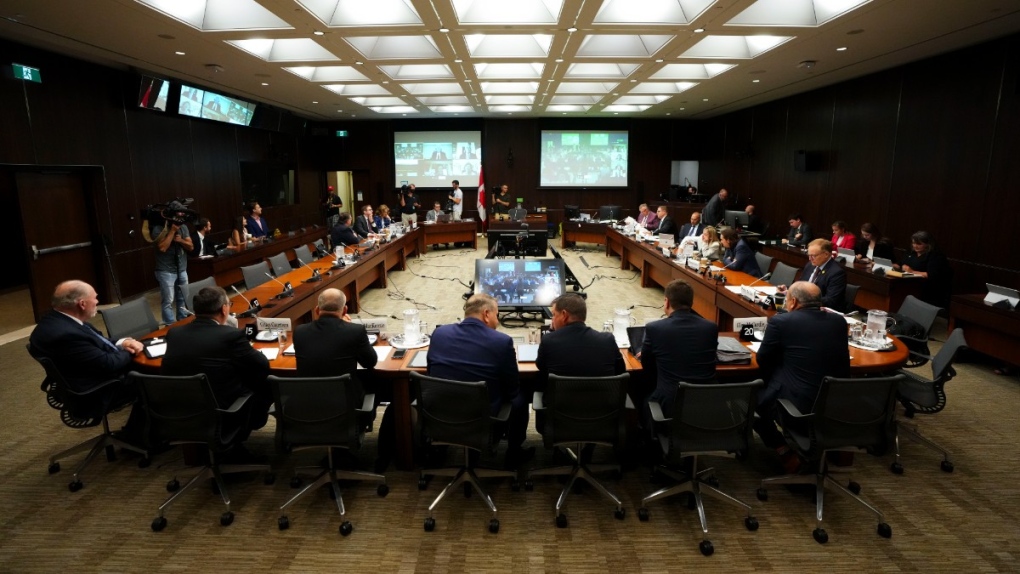Calls continue for a major shakeup at Hockey Canada following recent revelations around how the organization handled past claims of sexual assault.
The House of Commons Canadian Heritage Committee has been probing the organization’s handling of previous assault allegations, including setting aside a reserve funded by player fees to pay for “uninsured liabilities,” such as sexual abuse claims.
“I’m not surprised,” Brock McGillis, an LGBTQIA2S+ advocate and the first openly gay men’s professional hockey player, told CTV News Channel on Thursday.
“This is hockey culture, this is what it has been, this is what I’ve been saying since 2016 and it needs a complete overhaul.”
On Wednesday, it was revealed that Hockey Canada paid $7.6 million in nine settlements since 1989 involving sexual assault and abuse claims.
Of that, $6.8 million involved settlements related to Graham James, a former junior hockey coach convicted of sexually abusing players.
The $7.6 million does not include an undisclosed amount from a settlement, revealed in May, with a woman who sued Hockey Canada over an alleged sexual assault in London, Ont., that involved members of the 2018 Canadian world junior hockey team. The allegations have not been proven in court.
Hockey Canada has reopened its independent investigation into that case, which allegedly occurred after a Hockey Canada gala, and the law firm handling it says it has interviewed the complainant. The organization also plans to speak with nine players who were at the gala, but not interviewed in the initial investigation in 2018.
Hockey Canada executives have said the woman decided against speaking with police or investigators and chose not to identify the players involved at the time.
Police in London, Ont., have since reopened their investigation into the 2018 team. Halifax police are also investigating a historic alleged group sexual assault at the world junior hockey championships in 2003.
Meanwhile, Hockey Canada has been criticized for maintaining a reserve called the National Equity Fund, which comes from player fees to be used for “uninsured liabilities,” including but not limited to, sexual abuse claims.
Hockey Canada has since said it would no longer use the fund to settle claims of sexual assault.
“I think it’s disgusting, I think it’s sad,” McGillis said about the reserve fund.
“… I mean to play AAA hockey, parents are paying upwards of $20,000 a year for their child to play, and then to find out that some of that money is being used towards paying out victims of sexual assault. And furthermore, instead of doing proactive things like using money to really shift the culture and humanize issues and educate folks, we’re using it in a reactive way to pay out and silence victims.”
CALLS FOR HOCKEY CANADA LEADERSHIP TO RESIGN
McGillis and others have called for a change in leadership at Hockey Canada.
Among those calling for the resignation of Hockey Canada president and chief executive officer Scott Smith is former NHL player and victims rights advocate Sheldon Kennedy. Kennedy has been vocal about a culture shift in hockey following his own experience being abused by then-coach Graham James.
Kennedy shared a statement Tuesday on Twitter following the release of an “action plan” by Hockey Canada to combat “toxic” culture in its sport.
Smith has said that while an ongoing governance review may find he is not the best person to serve in the role, he believes he is “the right person to lead Hockey Canada to a new place.”
Politicians, including Prime Minister Justin Trudeau, also have taken aim at Hockey Canada. In June, the federal government suspended funding to the organization.
McGillis said recent events could prove to be a “watershed” moment for Hockey Canada, but noted it will depend on whether a new leadership team and board is put in place.
“I’m not fully optimistic yet, but I’m more encouraged than I have been in the past six years of doing this work,” he said.
Brady Leavold, a former Canadian Hockey League player and founder of Puck Support, an organization focused on substance abuse and mental health in hockey, told CTV News Channel on Wednesday that as one of the leading organizations in the country, Hockey Canada needs to “step up and go above and beyond.”
“I think initially I wanted to give them the benefit of the doubt, but as more stuff starts to come out it’s pretty clear to me that trust has been broken, and this is one of the most prestigious organizations here in Canada,” he said.
“And whether it was or not, I think the people here need to be able to trust those in charge and in my opinion, sitting here today, I think they need to do their due diligence and do the right thing for everybody and step down.”
In a statement issued Thursday, Ann Pegoraro, a University of Guelph professor and co-director of the National Network for Research on Gender Equity in Canadian Sport, said if Hockey Canada wans to regain the trust of Canadians, those in leadership need to resign.
She also called for more diversity in all sport management.
“You really can’t solve problems like this when you have the same people and mindsets that created the problems in the first place,” she said in the statement.
With files from CTV News and The Canadian Press
RELATED IMAGES

Witnesses Scott Smith, Hockey Canada president and chief executive officer, middle right, and Hockey Canada chief financial officer Brian Cairo, middle left, join fellow witnesses as they appear at the standing committee on Canadian Heritage in Ottawa, July 27, 2022, looking into how Hockey Canada handled allegations of sexual assault and a subsequent lawsuit. THE CANADIAN PRESS/Sean Kilpatrick